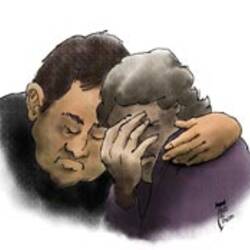Click here if you don’t see subscription options
Read Part 1 of this discussion.
Dear Nelson,
The election of Raúl Castro as president of the “Councils of State and of Ministers,” and therefore head of state of Cuba, on Feb. 24 marks the formal end of the reign of Fidel Castro, the most famous of the “boys from Dolores.” Since the latter fell ill in July 2006 speculation has been rife concerning Fidel’s ongoing role and the nature of the transition currently underway. Developments over the last eighteen months have suggested that while change is afoot in Cuba, it will be gradual and carefully channeled.
Patrick Symmes’ book emphasizes the degree to which the Jesuits at Dolores inculcated in their charges a sense of responsibility as privileged individuals to work for the common good. In his interview some years ago with Frei Betto, Fidel referred to his Jesuit education as a stimulus for his concern for socioeconomic justice. What separates Fidel and Raúl from most of the other boys of Dolores is the means they adopted to achieve the common good, namely a Communist regime that centralized political and economic decision-making in the party elite. This precipitated an ideological and political battle in Cuba that resulted in an exodus of one-tenth of the population, including most of Fidel’s schoolmates. What Fidel has styled as the “battle of ideas” raged within Cuba during the 1960s, and since then among Cubans on and off the island and with the United States. Fidel has stated that he regards his current role as evaluating the past in order to distill its relevance for the ongoing battle between communism and liberal capitalism.
In this struggle, civil society in Cuba has until recently played a relatively limited role, although that may be changing. Historically civil society in Cuba was active and highly diverse. As early as the nineteenth century, civic associations and special interest groups were common. Today the non-governmental sector on the island is relatively weak. However, if you look at the combination of state, quasi-state and non-state sectors that are actually discharging the traditional functions of civil society, such as pressuring the state for effective delivery of services, then civil society in Cuba is fairly pervasive. Indeed, “amphibians” are alive and well in Cuba, that is, individuals and groups that move between the state and non-state sectors in an effort to have more influence on public policies.
Mass organizations such as the Cuban Confederation of Workers (CTC) have since the early 1970s lobbied to modify government economic policies, as has the National Association of Small Agriculturalists (ANAP). Recently, representatives of the ANAP pressured Raúl’s administration for debt relief. Research centers and other “government organized non-governmental organizations” (GONGOS) have been among the most active in generating alternative proposals to those of the government. These groups were involved in the Academy of Sciences task forces that studied crises areas in Cuba, including poverty among the elderly, anti-social behavior and criminality among youths, as well as deficiencies in housing, transportation and food production. Not infrequently experts forced out of ministries or research centers for being too heterodox are solicited for advice by their former colleagues within the state structures. All these elements combined exercise the functions of civil society, although they violate strict definitions of it.
However, the unique nature of civil society in Cuba does limit its cohesiveness and hence its capacity to generate a consensual agenda. To date no element of civil society in Cuba has generated a mass base. Nevertheless, as the government of Raúl Castro has encouraged discussion within the mass organizations and the Communist Party, there has been increasing debate and criticism of public policies and programs. Indeed, some of the sharpest critiques have emanated from party cadres. In addition, in recent months high school and university students among others have become more vocal in expressing their discontent, particularly given the declining purchasing power of the Cuban peso. Ferment is on the rise in Cuba, stimulated in part by the government’s own actions. Raúl’s move to undertake some reforms may be an effort to burnish his brother’s legacy as a champion of socioeconomic justice. A good number of the classmates would challenge the validity of such a claim. However, the “boys from Dolores” may very well not be the final arbiters of that. It is their children and grandchildren who will have the task of reconciling Cubans both on and off the island in the future.
Regards,











